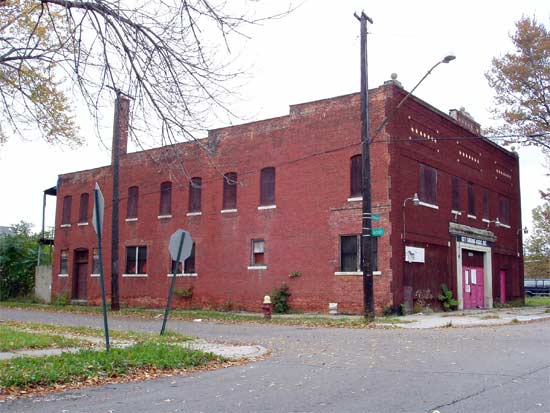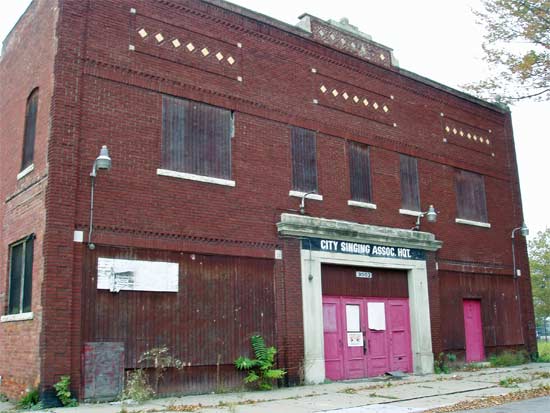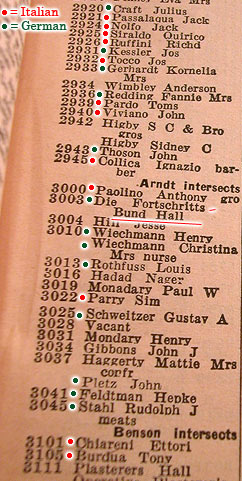Mikem Member Username: Mikem Post Number: 2402 Registered: 10-2003 Posted From: 68.43.15.105 |
I thought this might be an old theater, but today I discovered it was the Fortschrittsbund Hall of the German-Hungarian Progressive Association. Located at 3003 Elmwood, intersection of Arndt (between Mack & Charlevoix), it has since become, and may no longer be, headquarters of the "City Singing Association". What does Fortschrittsbund translate to? Who or what were the City Singing Association?   | ||
Spitcoff Member Username: Spitcoff Post Number: 69 Registered: 03-2004 Posted From: 69.242.221.186 |
We used to throw raves in this bulding in early 2000's | ||
Jt1 Member Username: Jt1 Post Number: 6769 Registered: 10-2003 Posted From: 198.208.251.24 |
According to babel fish it translates to 'Progress Federation' | ||
Gistok Member Username: Gistok Post Number: 1780 Registered: 08-2004 Posted From: 4.229.72.205 |
Most German social clubs started out as singing organizations or societies. Some examples: Harmonie Club (1849-circa 1978) Carpathia Club (1913-present) Saenger Halle (defunct) Maennerchor Rheingold (still active) Schwaebische Maennerchor (still active) Detroit Schwaben Unterstitzungs Verein (1883-present) Most of the old German clubs that are still intact today all have their functions in Carpathia Club 38000 Utica Rd., Sterling Heights. This is also where the old German-American Cultural Center (formerly located next to the Polish Century Club on East Outer Dr.) moved to in the mid 1990's. I too am a member of Carpathia Club. | ||
Jimaz Member Username: Jimaz Post Number: 149 Registered: 12-2005 Posted From: 68.2.191.57 |
Gistok, thanks. That info may come in handy. | ||
Livernoisyard Member Username: Livernoisyard Post Number: 76 Registered: 10-2004 Posted From: 69.242.223.42 |
In M'Waukey or Madison, WI, one such club would be a TurnerVerein - old-time gymnast clubs where the kids worked out in the gyms and the men drank (and drank) at their well-stocked cash bars. | ||
Michikraut Member Username: Michikraut Post Number: 111 Registered: 05-2004 Posted From: 80.136.74.152 |
Fortschritt = progress, Advancement Bund = Club, Association Turnen: gymnastics (verb) Didn´t know there was still so many German-American clubs- are they well attended? What is average age? | ||
Michikraut Member Username: Michikraut Post Number: 112 Registered: 05-2004 Posted From: 80.136.74.152 |
Fortschritt = progress, Advancement Bund = club, Association Turnen = gymnastics, (verb) I did not know there were still so many german-american clubs left in Detroit. Are they well attended? Sing in German? What is average age? | ||
Livernoisyard Member Username: Livernoisyard Post Number: 78 Registered: 10-2004 Posted From: 69.242.223.42 |
These German clubs usually serviced long-deceased first generation Germans/Austrians. Similarly, for other ethnic groups. They're usually bars or small bowling alleys today. Many have closed decades ago. Today, instead of gymnastics, it's usually soccer for any surviving clubs. Some rivalries between clubs could be fierce. | ||
Jimaz Member Username: Jimaz Post Number: 151 Registered: 12-2005 Posted From: 68.2.191.57 |
Michikraut, here's the website for the Carpathia Club that Gistok mentioned: http://www.carpathiaclub.com/ | ||
Noggin Member Username: Noggin Post Number: 48 Registered: 09-2004 Posted From: 71.227.102.104 |
It looks like this group had its beginning with what was later the Carpathia Club. From http://www.carpathiaclub.com/H istory/history1.htm : "The date was January 5, 1913. In the German community of Detroit’s East Side, the wind howled through the streets, adding a chill to the already bitter cold Sunday afternoon. But inside Beecher Hall on Michigan Avenue, a roaring fireplace provided warmth for 57 men who had gathered in response to an advertisement published in the "Detroiter Abendpost", a prominent German newspaper. The ad called for the creation of a German-Hungarian Singing Society and anyone interested was invited to attend. Now, they sat in the room, listening attentively to the man who spoke; the man responsible for the summons, Peter Schock. Schock considered himself an "Ostschwabe", or "East Swabian", having migrated from Austria-Hungary’s eastern frontier to Philadelphia, before making his home in Detroit. He had been witness to the all too often harsh treatment of his fellow Schwaben by the numerous singing societies and other organizations prospering in Detroit’s booming German ethnic community of the time. In those days, German nationalism was at an all time high as strong sentiment toward anything from the "Fatherland" prevailed among the proud immigrants of Detroit’s German community. Rightfully so, there was much to be proud of. Back home, the German Empire was at its peak, under the leadership of Prussia’s Kaiser Wilhelm II. To the South, Germany’s cousin and close ally, Austria-Hungary, ruled by the Hapsburgs for 800 years, stretched from the Alps to the Black Sea. In Detroit, the "Reichsdeutsche", immigrants from the "Reich", or Germany proper, considered the Ostschwaben to be "impure" in their German ethnicity, and often treated them as lower class. The Swabians were discouraged from joining many of the German singing societies, and even, at times, had their memberships rejected. They were referred to as Ostschwaben because they came from Austria-Hungary’s eastern-most region along the Danube River, in the Pannonian Basin, a land considered to be frontier by residents of Vienna and Berlin. Because of the strong political influence of the Hungarians over that part of the Hapsburg Empire, the language of the Ostschwaben came to include many words and expressions native to the Magyars. This, combined with the fact that the Ostschwaben dialect developed as an amalgam of several South Western German dialects, made it significantly different from the "Hochdeutsch", or "High-German" spoken by the Reichsdeutsche. Detroit’s Ostschwaben came to the U.S. speaking the language of their homeland, not well versed in "Hochdeutsch". The Reichsdeutsche looked on the Ostschwäbische speech more as gibberish, than a legitimate German dialect. Further, fueled by a strong national sentiment, the Detroit Reichsdeutsche often thought of the Schwaben as "being good for little else but making a mouth watering goulash". Meanwhile, the Swabians were reluctant to join local Hungarian organizations, because most Swabians spoke only broken Hungarian, at best. For that matter, the Schwaben never sought the company of the Magyars backhome, since the Ostschwaben were treated as "buta svabs" by the Hungarians and largely ignored. Similarly, the Americans had nothing in common with the Ostschwaben either, looking down on them as "hunkies" . Few things kindle human resolve more than not being fully appreciated as an equal and, according to writings by Schock’s associate Peter Gänger, "...Schock would not have been Schock had he not mustered his entire oratory skills to remedy the unpleasant situation which had befallen the Detroiter Ostschwaben". It was no wonder that, on this memorable afternoon, with unanimous consent and enthusiasm, a new Singing Society was created with Peter Schock as its first President. The Society called itself the "German-Austrian-Hungarian Singing Society", and within days, established a constitution and elected its first board of directors. The Society carried that name until June 22, when it merged with the already established "Deutsche-Ungarische Fortschrittsbund", or "German-Hungarian Progressive Union". The "German-Hungarian Singing Society and Progressive Union", (GHSSPU) was born that day with Schock, once again, as President. Despite the merger, singing remained the focus for the Schwaben, and Beecher Hall served as the focal point for meetings, practices, and gatherings. Mr. Joseph E. Schmitz was retained as chorus director. This turned out to be a good move, because the talented and capable Schmitz molded the untrained collection of voices with notable results. His talent and enthusiastic love for music were responsible for building a mixed chorus that was on par with the other singing societies in the area. The performances were given an added boost of professionalism by the well-trained, rich, tenor voice of Fred U. Schreiner, who became a longtime member of the group. The chorus quickly gained in notoriety, not only within the German community, but also in American cultural circles around the Detroit area. As a result, membership grew rapidly, and the Society was forced to move out of Beecher Hall in September to a larger facility at 514 Gratiot Avenue. By the fall of 1913, the GHSSPU had hundreds of members, most of them Ostschwaben, and on October 26, they established an all-female chorus with 24 members. Also under Schmitz direction, the ladies chorus became well respected and soon received high praise by the Abendpost’s chief writer Maximillian Markus. The mixed chorus’ rapid growth during this time period must have contributed to the rift that existed, almost from the beginning, between the Ostschwaben and their Hungarian Progressive brothers. The union was doomed from the start, first of all, because of the language and cultural differences between the Swabians and the Hungarians. Contrary to what the "Reichsdeutsche" believed, the Schwaben were, apparently, more German than Hungarian after all. In addition, both groups had differing interests, with the Schwaben focused mostly on singing. The chorus’ rapid success and expansion seemed to leave the German-Hungarian Progressive Union behind, and in February 1914, barely 8 months after their merger, the two groups split. This event necessitated another name change, since "German-Hungarian Singing Society and Progressive Union", would no longer be appropriate. Happily, simplicity won the day as the name "Carpathia Singing Society" was chosen. This name won favor among members because most could claim origins in the vicinity of this Eastern European mountain range. Carpathia continued to grow in membership and success throughout 1914. Good financial management by the Society’s Board of Directors, still under the leadership of Schock, made it possible to pay several of the officers. At a meeting on July 12, the treasurer, as well as the recording-, correspondence- and finance secretaries, were granted a yearly allowance of $5.00. The hall manager of the time, Mr. G. Brenner, also received a monthly stipend of $10.00. This financial success continued, and by 1915, Carpathia began offering insurance coverage to its membership. Because insurance was less common at that time, it was not unusual for many German organizations to offer similar benefits." | ||
Detroitduo Member Username: Detroitduo Post Number: 501 Registered: 06-2005 Posted From: 194.138.39.56 |
Hey, Michikraut! How's the Fasching celebrations going? :-) | ||
Lowell Board Administrator Username: Lowell Post Number: 2283 Registered: 10-2003 Posted From: 66.167.211.50 |
Here is a shot of Elmwood street near the Forschrittsbund Hall from the 1929 Detroit City Guide. It is interesting that this was a predominantly German and Italian enclave.  | ||
Livernoisyard Member Username: Livernoisyard Post Number: 86 Registered: 10-2004 Posted From: 69.242.223.42 |
Wasn't Sonny Bono's family near there? His father drove a meat truck in the near East side around 1950, as did Sonny himself when he returned to Detroit from CA as a young adult. Wonder if his father name is listed? Somebody once told me that the Bonos lived near Mack & Gratiot. | ||
Gistok Member Username: Gistok Post Number: 1792 Registered: 08-2004 Posted From: 4.229.6.164 |
Thanks for printing that Noggin. I am embarrassed to say that (even though I am a Carpathia Club member)I wasn't aware of the website (duh!). Carpathia Club moved to Warren (near 9 Mile & Van Dyke) in the 1960's, and move to Sterling Heights in the early 1990's. My father was a Danube German. His ancesters moved from the German Rhine region to the lower Danube in the 1740's. After the defeat of the Turks (they were pushed back to the southern Balkans) in 1683, much new fertile unoccupied land became available in and area that today is where Hungary, Romania and Yugoslavia come together. After WWII these people were forced to flee (by the Russians) to Austria and Germany. There were over 1 million refugees. One of the most famous Danube Germans that Americans know about was Johnny Weissmueller, the man who played Tarzan in the 1930's film classics . | ||
Lowell Board Administrator Username: Lowell Post Number: 2285 Registered: 10-2003 Posted From: 66.167.211.50 |
Parents: Santo Bono, mother Jean, listed as furnaceman, at 11406 Camden [Gratiot - Conner] in 1940 guide...further east and north, but also a big Italian hood. Yesterday was Sonny's Birthday! Salvatore Phillip Bono Birth: 16 FEB 1935 Detroit, Wayne, Michigan | ||
Livernoisyard Member Username: Livernoisyard Post Number: 89 Registered: 10-2004 Posted From: 69.242.223.42 |
Sonny must have been some five years or so older than I thought. He left when he was seven (1942) and returned ten or eleven years later. He probably knew where that flat was on the West Side while making his (Kosher?) meat runs on Dexter - hide that porque... | ||
Southwestmap Member Username: Southwestmap Post Number: 377 Registered: 01-2005 Posted From: 64.79.90.206 |
Lowell, both you and Mikem have city directories. Where did you get your copy? | ||
Michikraut Member Username: Michikraut Post Number: 114 Registered: 05-2004 Posted From: 80.135.55.187 |
Guten Tag Detroitduo, Karneval is starting to hit its stride. Some of the Stores along the parade route have alaready started the construction of the scaffolding to protect the show-windows from breaking due to the crush of the crowds. Most of the big squares have huge tents set up for the "karneval Vereins" = Mardi-Gras Orders. All the stores are stocked with costumes and such for the revelars. To be truthful- I tend to ignore the whole thing. Right now am more concentrated on looking for new work. Don´t really have much time or attitude for Party-hearty. I used to hate this time of year for my former partner used to use the festivities and "freizügiges Leben" to get out there and flirt and kiss "ein Busschen" as many as he could. "It is all allowed- it is Karneval"! yeah right! notice he is my "EX". Will probably go out with some freinds for the main parade on Monday, as one does get caught up in the masses and pretty soon, one startes to sway and lock arms with neighbors after having a beer or two (which starts flowing freely next Thursday (Alt Weiberfasttag = old ladys day) and ends with a massive hang-over on "Aschermittwoch = Ash Wednesday". Teusday night the bars have a bonfire on just about every major crossing (those with two or more bars) and then the city really gets loud with drumming, singing, and smokey from all the bonfires and burnign "karneval effigies". That is sort of cool- does still have some of the Middle Ages mysticism. thank whoever for the long story about the Schwabians. Even today over here in Germany the Schwabians are really put down and derided "as the dumbest of the dumb" Instead of using "polish" for the dimwitted in jokes- germans use "Schwabians". One can not understand a native speaking schwabian- but then the same can be said for a Bayern or many of the different dialects still spoken across germany. My ex-parents-in-laws live in Münsterland (a beautiful parklike farmland between Holland and the Rhein Valley.) There they (the farmers and small villages) speak "Platt". An odd mixture of old german, old dutch, some parts english, and "god knows what else". For awhile I was starting to understand some of what they were saying- but really quite hopeless as my "hochdeutsch" is not the best. | ||
Gistok Member Username: Gistok Post Number: 1802 Registered: 08-2004 Posted From: 4.229.72.43 |
Michikraut, the Donauschwaben (Danube Swabians) that we've just discussed are different from the Schwaben (Swabians). Schwaben is a region in south central Germany near the city of Ulm. I think that it is those Schwaben that you are referring to. The Danube Schwaben migrated from Hungary, Yugoslavia and Romania, to all over Germany, Austria, USA, Canada, Brazil, Argentina and Chile. In Brazil they live in a region where they speak primarily German, and maintain their old world ways. (No Mengele jokes please!) | ||
Gistok Member Username: Gistok Post Number: 1803 Registered: 08-2004 Posted From: 4.229.72.43 |
Also, my brother-in-law is Transylvanian Saxon. They migrated from the German states to Transylvania in the 1180's. They had been away from Germany for over 8 centuries, and when I hear his family talking in their Transylvanian Saxon dialect, I can't understand a word, even though I can speak 3 German dialects (High German, Danube Swabian, and Franconian). These are the same Transylvanian Saxons that are depicted in the old Dracula movies, as well as being the historic enemy of Vlad Dracul (Vlad the Impaler), 15th century prince of Wallachia (that the Dracula legend is based upon). Ironically it was these German Transylvanian Saxons that built most of the towns and castles of Transylvania, making it a tourism gold mine for Romania today. The Transylvanian Saxons, like most of the other 13 million ethnic Germans living in eastern Europe for centuries, moved to Germany and Austria (and beyond) at the end of WWII with the advance of the Russian Army moving westward thru Europe in 1944-45. | ||
Detroitduo Member Username: Detroitduo Post Number: 502 Registered: 06-2005 Posted From: 194.138.39.56 |
Hey, Michikraut... How can I get in touch with you? |